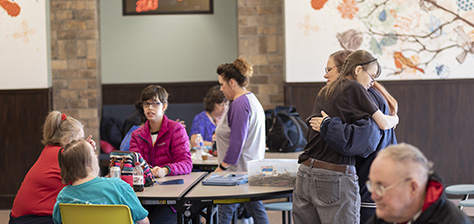
A Better Life through Gentle Teaching
Individuals with cognitive limitations or challenging behaviors often lack effective ways to experience companionship and trust. Overcoming those limitations and modifying behavior in positive ways are crucial steps in providing a better life.
At Disability Supports, staff members are taught to interact with clients in ways that teach them to feel safe and valued — not on the basis of compliance or obedience. This technique is called Gentle Teaching.
Gentle teaching is a positive behaviorial support program that promotes interdependence between caregivers and clients. This practice affirms the inherent worth of all people, creating a sense of companionship, feelings of safety and security, and mutual transformation.

Creating companionship and trust is the first step in gentle teaching. Only when a client feels safe will they be able to be open to learning. True friendships are encouraged in which both client and staff enjoy mutual support, empathy and opportunities to share. Tasks and activities are used as vehicles for engagement.
Caregivers communicate acceptance in all ways. Gentle Teaching “tools” for caregivers include the use of hands, eyes, words and presence to help communicate cooperation. Appropriate but warm, loving physical touch fills a universal spiritual need in each soul, and is quite the opposite of other agencies’ clinical, hands-off approach.
Gentle Teaching helps prevent and minimize conflict and disharmony. This style of care uses unconditional love rooted in kindness, instead of punishment strategies, to resolve conflict. In time, relationships grow stronger and tensions weaker. Much like a successful family unit, this gentle way of living makes Disability Supports an interdependent, confidence-inspiring community.
Gentle teaching is simple. We encourage people to be in tune with themselves and the people they are around. It is a way of being with others. It’s just being nice.
